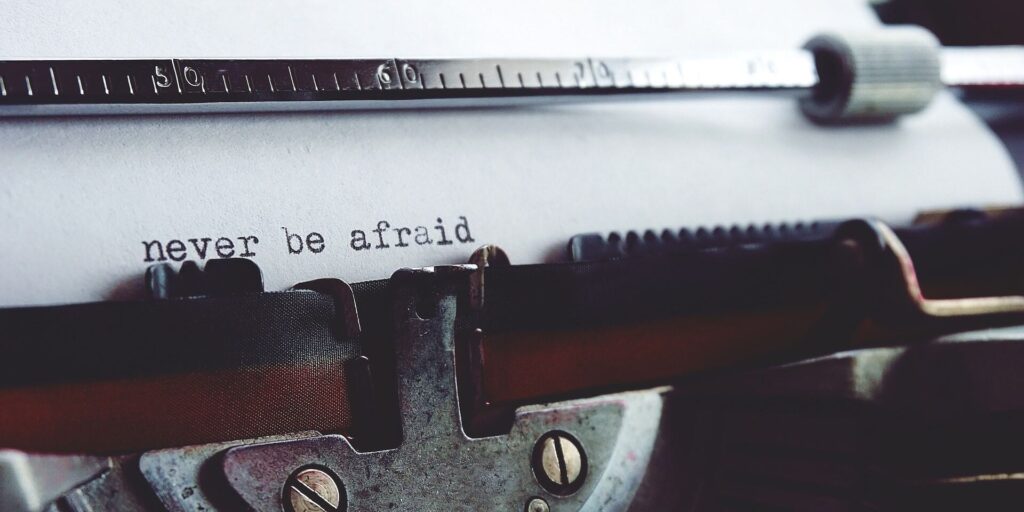Writing requires a lot of time alone in your head. But if you’re a typical writer, it’s often loud and mean in there.
The fear of judgment is universal and — for most writers from time to time — paralyzing. We’ll talk about how no one is exempt from this fear of judgment and attempt to loosen its debilitating grip on us.
It’s variable by the type of writing, but in almost every piece, there is some vulnerability involved for the writer, and that can leave us feeling exposed.
There is nothing to writing. All you do is sit down at a typewriter and bleed.
Ernest Hemingway
What are writers afraid of?
The most affecting, persuasive art often takes a proverbial pound of flesh from the artist, so when you’re the artist, considering which hunk of yourself to lop off for the piece is intimidating. Not only do you need your words to convey the feelings and ideas you intend, but it feels like when you’re sharing parts of you that you’re leaving yourself, as a person, open to judgment.
Even if your piece contains experiences and insights you’ve gained from your life, the product you put out is not you, and reactions to it are not judgments of you as a human. There are so many variables that affect how a reader perceives a piece, and it will mess with your psyche and the quality of your art to try to predict or control for the criticism.
Begin to teach yourself not to take reactions to your work personally. Yes, this is easier said than done, but the more pieces you submit for publication, the less each one stings when rejected or negatively received. Eventually, you will accumulate positive reactions and acceptances, as well.
It’s also helpful to follow writers on social media to see that almost everyone is feeling vulnerable and afraid much of the time. Books about writing by writers, such as Anne Lamott’s Bird by Bird or Steven King’s On Writing, also help put things in perspective. This fear of judgment is not unique to you. Even the most prolific, highly achieved writers feel it.

Dealing with our inner critic
The nastiest critic is typically the little voice in our head. Many times, it’s the voice of the most negative evaluations. It has insight into all of the heights your piece could have reached and the ideas you had to leave on the drawing room floor — not just what showed up on the final draft. It’s the voice of all the negative thoughts that run through our minds. And it seems to get bigger and badder when we put ourselves out there.
Your readers will not have all of this. They don’t know what could have been, they only see what is. Trust yourself that you chose the best path for the piece and had good reasons for making your writing decisions. As you develop your craft, your decision-making process will improve, and you’ll find you can trust your instincts even more.
But beyond that, know that your inner voice will often be much more negative than the voices around you. After all, most of us would never speak to a friend the way we sometimes speak to ourselves. When we experience extreme fear about sharing our writing, we’re often most afraid of someone mirroring our own negative opinions back to us.
Shock value
Another reason writers fear judgment is the inclusion of racy content. We might be intrigued by how bodies decay and want to write an essay about it. Or we may want to include a graphic sex scene in our short story because it serves the characters well. But we fear that our family, friends, and readers will judge us if we do.
Instead of limiting your exploration of more provocative themes, consider examining the source of your anxiety about it and working through it. For really graphic topic, you might consider adding a caution or trigger warning. You can even use a pseudonym if you really worry that your relationships (or non-writing career) will be negatively impacted by the publication.

Opening up to the opinions of others
In general, it takes a lot of nerve to put yourself out there. It’s not easy to say, “See this thing that I did? I wrote that. Please read it.” It can feel like pandering and like begging for support and love. We fear that we’re deluding ourselves to think we have anything to say, and asking anyone to buy in can feel pitiful. There’s a sense that this “writing thing” you’re doing is not legitimate and may never be. This can be especially true if you don’t have a formal writing education.
This author, for example, has been writing for fifteen years. I have written two books, a movie, and countless essays, short stories, and plays. But since I’m not making a living off of it, and you can’t (yet!) walk into a bookstore and pull one of my works off a shelf, I still refer to myself as a casual writer hobbyist.
I pour a lot of myself into this craft. It’s the thing I most want to do in this world. But I fear that if I admit how hard I work or how badly I want this “writing thing” to happen, I’ll be seen as idealistic and absurd. How dare I ask my people to support me in my slow, small progress toward my goals? How dare I declare that I am a writer? I’ve started to force myself to chant the affirmation; I write, therefore, I am a writer.
It’s also easy to fall into the trap of thinking that all stories have already been told. But they haven’t been told by you. Your unique experiences and voice will make an impact in ways you cannot even imagine. If you’re a writer, then write.
No Black woman writer in this culture can write “too much.” Indeed, no woman writer can write “too much”… No woman has ever written enough.
Bell Hooks
The secret fear of success
Another really fun thing about putting yourself out there is you may not just be afraid of failure and rejection. You may also fear success. Fear of success is a real thing and can actually lead you to subconsciously self-sabotage your efforts.
With success comes higher expectations and a larger audience of people to read, and judge, your work. You might also worry that success will change your writing. Many of us fear that being successful will change us in negative ways or in the eyes of our friends and family members.
Finding your way through
Once you’ve found a way through the fear of your writing not being good enough, you not being good enough, and the fear of failure and success, and you sit down with a blank page in front of you, there can also be a fear of getting it wrong. There are so many beautiful words in the language. What if you can’t harness the right ones to line up to tell this story? What if the message only means something to you, inside your head? What if, even after you line up all those lovely words into a shape that is compelling and wise and wonderful, people still don’t like it? What then?
In that case, you’ve still won. The important thing is that you’ve written something you’re fond of. You’ve done the very best you can do, and you’ve learned from the experience. It’s possible that the piece didn’t find its audience, yet. But it’s also likely that you have other pieces in you that will.
Either way, you put something new into the world and took a risk, despite the fear of judgment. You wrote, and that is an accomplishment.
